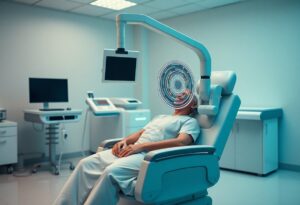Just as traditional therapies can support your journey to sobriety, neurofeedback offers a powerful alternative to help you regain control over your life. This innovative approach targets brain function, enabling you to identify and modify unhealthy patterns associated with addiction. By retraining your brain, you can enhance your emotional regulation and reduce cravings. To explore how neurofeedback can be a valuable tool in your recovery process, check out The Benefits of Neurofeedback in Addiction Recovery for deeper insights.
Key Takeaways:
- Brain Regulation: Neurofeedback promotes self-regulation of brain activity, which can help individuals manage cravings and reduce the likelihood of relapse during recovery.
- Emotional Stability: This therapy enhances emotional resilience by strengthening neural pathways, leading to improved coping skills and reduced anxiety or stress associated with addiction recovery.
- Personalized Treatment: Neurofeedback is tailored to each individual’s unique brain patterns, supporting a more effective and personalized approach to tackling addiction challenges.
Understanding Neurofeedback
What is Neurofeedback?
Any discussion about neurofeedback begins with understanding its fundamental concept. Neurofeedback is a therapeutic technique that trains individuals to alter their brain activity through real-time monitoring and feedback. By using special equipment, you can learn how to gain control over your brain functions, which can be particularly beneficial for those overcoming alcohol and drug addiction.
The Science Behind Neurofeedback
Behind neurofeedback lies a rich tapestry of neuroscience that explores how brain waves influence your mental state and behavior. Neurofeedback utilizes EEG technology to measure electrical activity in your brain, providing feedback about which brain patterns are associated with various states of cognition and emotion. This information empowers you to make adjustments and promote healthier brain functions.
Another important aspect of neurofeedback is its effectiveness in retraining neural pathways. When you engage in neurofeedback sessions, you often receive visual or auditory cues that indicate when your brain is functioning optimally. By actively participating in this process, you can reinforce positive brain wave patterns, ultimately supporting your recovery journey from addiction.
Neurotransmitter Regulation and Brain Waves
Between the activities of neurotransmitters and brain waves, there exists a complex relationship. Neurofeedback not only focuses on brain activity but also influences the regulation of neurotransmitters, which play a significant role in how you feel and behave. By learning to manage your brain waves, you can subsequently enhance neurotransmitter balance, contributing to improved mental health and reduced cravings.
Waves of brain activity inform your emotional state and decision-making processes. When engaging in neurofeedback, you train your brain to target specific frequencies associated with relaxation, focus, and emotional stability. As you improve your control over these brain waves, you also influence the release and balance of neurotransmitters like dopamine and serotonin, further aiding your recovery from addiction and promoting a healthier lifestyle.
The Connection Between Addiction and Brain Function
It is important to understand how addiction intertwined with your brain’s functioning can lead to a downward spiral. Your brain undergoes significant changes when you develop an addiction, impacting decision-making, impulse control, and emotional regulation, which can make recovery increasingly challenging.
How Addiction Affects Brain Chemistry
Brain chemistry is significantly altered by substance use, impacting neurotransmitter levels such as dopamine, serotonin, and GABA. These chemicals play important roles in mood regulation, pleasure, and reward. When you repeatedly engage in substance use, your brain begins to rely on these external substances to achieve feelings of happiness, which can lead to an imbalance that perpetuates your addictive behaviors.
Common Neural Pathways Involved in Addiction
Any substance addiction typically engages specific neural pathways that govern reward and motivation. The mesolimbic pathway, comprising the ventral tegmental area and nucleus accumbens, is particularly affected, reinforcing the behaviors associated with substance use.
Affects on these neural pathways can create a cycle of craving and compulsion, making it difficult for you to resist using the substance despite the negative consequences. Your brain learns to prioritize these sought-after experiences over other important life functions, which can interfere with your relationships, career, and overall well-being.
The Role of the Prefrontal Cortex
To comprehend the impact of addiction, you must consider the prefrontal cortex, the area responsible for executive functions such as decision-making, impulse control, and reasoning. When your brain is altered by substance abuse, the functionality of the prefrontal cortex becomes compromised.
Further impairments in this critical region can lead to poor judgment and increased impulsivity, making you more susceptible to relapse. As you work towards recovery, understanding the role of your prefrontal cortex can help you develop strategies to rebuild these important cognitive functions, ultimately aiding in a healthier path forward.

Benefits of Neurofeedback in Addiction Recovery
After initiating neurofeedback training, you may experience profound changes in your addiction recovery journey. This innovative therapeutic approach targets brain functioning and can be leveraged to support various aspects of your recovery from substance use disorders.
Reducing Cravings and Relapse Rates
Any form of addiction often comes with intense cravings that can lead to relapse. Neurofeedback has shown promise in reducing these cravings by training your brain to self-regulate its responses to triggers, making it easier for you to resist urges and remain in recovery.
Enhancing Self-Regulation and Control
An important aspect of overcoming addiction is developing self-regulation skills. Neurofeedback encourages your brain to optimize its function, enhancing your ability to exert control over impulsive behaviors, which is often a significant challenge in addiction.
Enhancing these self-regulation skills through neurofeedback can empower you to make healthier choices. As your brain learns to reinforce positive thought patterns, you will find it easier to dismiss cravings and resist triggers, creating a healthier mental environment that supports long-term recovery.
Improving Emotional Regulation and Stress Management
To navigate the complexities of addiction recovery, improving your emotional regulation and stress management is vital. Neurofeedback can aid in balancing your emotional responses, enabling you to cope with stressors more effectively.
Emotional regulation is important in preventing relapse, as unmanaged stress and unresolved emotions can lead to substance use as a coping mechanism. By utilizing neurofeedback, you learn to stabilize your mood and face challenges with a renewed sense of resilience, ultimately contributing to a healthier and more balanced recovery experience.
The Neurofeedback Process
Despite common misconceptions, the neurofeedback process is a structured approach designed to support your recovery from alcohol and drug addiction. Through specialized training and assessment, you can improve your brain function, ultimately aiding in your emotional stability and mental clarity. This process often begins with an initial assessment to understand your unique needs and set attainable goals for your recovery journey.
Initial Assessment and Goal Setting
After your initial consultation, a comprehensive assessment will be conducted to evaluate your brainwaves and identify areas that require improvement. This is imperative for creating a personalized training program. By setting specific, measurable goals, you position yourself for success in overcoming challenges related to addiction.
Session Structure and Techniques Used
Along with personalized assessments, each neurofeedback session is tailored to your progress. Typically, you will wear sensors that monitor your brain activity while engaging in various activities, such as watching videos or playing video games. This interactive approach helps guide your brain into optimal states through real-time feedback.
Structure is vital in neurofeedback sessions. The use of EEG (electroencephalogram) technology allows you to visualize your brain activity, facilitating learning and self-regulation. As you engage with the provided feedback, your brain begins to adapt, helping to reinforce healthier thought patterns and emotional responses that support your recovery.
Duration and Frequency of Treatment
Session duration typically ranges from 30 to 60 minutes, depending on your individual needs and the techniques being employed. It’s recommended that you attend sessions multiple times a week to maximize the benefits and foster consistent progress throughout your recovery journey.
Even with a busy schedule, prioritizing your neurofeedback sessions can lead to significant improvements. Many individuals find that regular participation, often lasting several weeks or months, enhances their resilience against relapse as they develop stronger cognitive control and emotional stability.
Case Studies and Evidence
Unlike many traditional treatment methods, neurofeedback has shown promising results in the recovery journey from alcohol and drug addiction. Several case studies support its effectiveness, highlighting the positive changes among participants. Here are some notable findings:
- In a study involving 30 participants undergoing neurofeedback for alcohol use disorder, 70% reported a significant reduction in cravings and relapse rates over a six-month follow-up period.
- A 2018 case series outlined the experiences of 15 individuals with drug addiction who underwent neurofeedback therapy, with 80% demonstrating reduced anxiety and improved emotional regulation after 12 sessions.
- Research involving 50 clients in a rehabilitation center indicated that those who received neurofeedback in conjunction with standard treatment had a 50% lower relapse rate compared to those who only received traditional therapy.
- Another longitudinal study tracked 100 individuals post-neurofeedback treatment for cocaine addiction, revealing that 65% maintained abstinence for over a year, alongside improved mental health outcomes.
For further understanding of neurofeedback, you can explore What Is Neurofeedback for Addiction?.
Success Stories in Alcohol Addiction Recovery
An increasing number of individuals have shared their success stories after integrating neurofeedback into their alcohol addiction recovery. Many report feeling more in control of their cravings and a renewed sense of mental clarity, enabling them to navigate social situations without the fear of relapse.
Success Stories in Drug Addiction Recovery
On the frontlines of drug addiction recovery, numerous accounts emphasize neurofeedback’s role in healing. People describe a profound improvement in focus and stability, which allows them to concentrate on rebuilding their lives post-addiction.
Addiction, in many instances, alters brain function, making recovery challenging. However, neurofeedback provides a non-invasive way to retrain the brain, helping individuals regain their focus and emotional balance, ensuring they can better cope with the stresses that trigger substance use.
Limitations and Challenges in Current Research
Beside the promising outcomes, some limitations exist in current research surrounding neurofeedback for addiction recovery. Variability in treatment protocols and participant demographics may affect the generalizability of findings.
At this stage, research continues to evolve, and while many studies reveal positive results, there is a need for larger-scale, randomized controlled trials to solidify the efficacy of neurofeedback therapy. Additionally, the subjective nature of self-reported data poses challenges in assessing the true impact of neurofeedback on addiction recovery. Your understanding of these hurdles is important as you consider neurofeedback as an option in the recovery process.
Complementary Therapies and Holistic Approaches
Now, you can enhance your recovery journey by integrating neurofeedback with various complementary therapies and holistic approaches. These methods can work synergistically with neurofeedback to support your overall well-being, improve mental health, and foster long-lasting sobriety. This multi-faceted approach addresses not just the symptoms of addiction but also the underlying emotional and psychological factors that contribute to substance use disorders.
Integration with Cognitive Behavioral Therapy (CBT)
Therapies such as Cognitive Behavioral Therapy (CBT) can significantly enhance the effectiveness of neurofeedback. By addressing negative thought patterns and behavioral triggers, CBT helps you develop healthier coping strategies. When combined with neurofeedback, the insights gained from both therapies create a more comprehensive recovery plan tailored to your needs.
Role of Mindfulness and Meditation
Role of mindfulness and meditation practices can play a significant role in your recovery. These techniques help you remain present in the moment, reduce anxiety, and improve emotional regulation. By incorporating mindfulness into your routine, you can cultivate a greater awareness of your thoughts and feelings, which aids in resisting the urge to use substances.
But mindfulness and meditation go beyond just awareness; they allow you to cultivate a deeper connection with yourself. This improved self-awareness can help you identify triggers and manage cravings more effectively. Engaging in these practices regularly can also foster a sense of peace and calm, making it easier to navigate challenges that arise during recovery. For many individuals, the integration of mindfulness techniques with neurofeedback creates a holistic support system that enhances daily life and sustains sobriety.
Nutrition and Lifestyle Modifications
Before launching on your recovery journey, consider how nutrition and lifestyle modifications can support your goals. A balanced diet rich in nutrients can improve brain function, stabilize mood, and decrease cravings, making it an vital component of your recovery strategy.
Plus, making intentional lifestyle changes, such as regular exercise and establishing a supportive social network, can significantly amplify the benefits of neurofeedback. Physical activity releases endorphins, which elevate mood and reduce stress, complementing the brain training you receive from neurofeedback. Prioritizing a healthy lifestyle, combined with neurofeedback sessions, can help create a strong foundation for lasting sobriety and well-being.

Future Directions and Research Opportunities
Your understanding of neurofeedback’s role in addiction recovery can be expanded by exploring future directions and research opportunities in this field. As studies continue to emerge, you may discover new insights that can enhance your recovery journey. For more information, you can read about how Neurofeedback Can Help Break the Cycle of Addiction.
Advances in Neurofeedback Technology
Above all, advances in neurofeedback technology may lead to more effective and accessible treatment options for individuals struggling with addiction. New devices and protocols are regularly being developed, which may allow for more personalized and precise applications of neurofeedback therapy.
Potential for Broader Applications in Mental Health
On the other hand, the potential for broader applications of neurofeedback in mental health extends beyond addiction treatment alone. Emerging research suggests that neurofeedback may also benefit conditions such as anxiety, depression, and PTSD, making it a versatile tool in mental health care.
With the growing body of evidence supporting neurofeedback’s efficacy in various mental health disorders, researchers are increasingly interested in investigating how this approach can be integrated into comprehensive treatment plans. This could lead to multidisciplinary interventions that leverage neurofeedback alongside traditional therapies, providing you with more well-rounded support in your recovery process.
Recommendations for Further Studies
Before plunging into further research opportunities, it’s necessary to address what additional studies could strengthen the understanding of neurofeedback in addiction recovery. This includes longitudinal studies that assess long-term outcomes and efficacy across diverse populations.
Further, there is a need for comparative studies that evaluate neurofeedback against other therapeutic modalities. Such research can clarify the unique benefits of neurofeedback, allowing you to make informed decisions about your recovery options while promoting a broader understanding of its role in addressing complex addiction challenges.
Summing up
From above, it’s evident that neurofeedback can be a valuable tool in your journey toward recovery from alcohol and drug addiction. By providing real-time feedback on your brain activity, you can learn to self-regulate your mental states, ultimately reducing cravings and improving emotional resilience. This innovative approach enables you to gain better control over your behaviors, enhancing the effectiveness of traditional therapies. As you explore the potential benefits of neurofeedback, you can empower yourself to achieve lasting recovery and a healthier, more fulfilling life.
FAQ
Q: How does neurofeedback improve brain function in individuals recovering from addiction?
A: Neurofeedback, also known as EEG biofeedback, helps to enhance brain function by training individuals to regulate their brainwave activity. Through real-time feedback, patients learn to increase the production of positive brainwave patterns while decreasing patterns associated with stress and addiction. This process promotes emotional stability and self-regulation, aiding in recovery from substance abuse.
Q: Can neurofeedback therapy help manage cravings associated with addiction?
A: Yes, neurofeedback therapy can be beneficial in managing cravings. By improving self-regulation and emotional well-being, individuals often report a reduction in unwanted cravings. The therapy may help in rebalancing the brain’s reward system, which can diminish the intensity and frequency of cravings, providing a supportive tool during the recovery process.
Q: How long does it typically take to see results from neurofeedback therapy for addiction recovery?
A: The duration for observing results can vary among individuals based on several factors such as the severity of the addiction, prior treatments, and personal circumstances. Generally, some patients begin to notice improvements after a few sessions, often within 10 to 20 sessions. Long-term benefits often appear with consistent therapy and practice.
Q: Is neurofeedback therapy safe for individuals with a history of substance abuse?
A: Neurofeedback is considered a safe and non-invasive therapy for individuals recovering from substance abuse. It poses minimal risks when conducted by trained professionals. However, it is important for patients to discuss their specific history with healthcare providers to ensure the therapy aligns with their recovery plan and to address any concerns they might have.
Q: Can neurofeedback be used alongside other forms of treatment for addiction recovery?
A: Absolutely, neurofeedback can complement other treatment modalities such as counseling, group therapy, and medication. Integrating neurofeedback into a comprehensive recovery plan may enhance overall effectiveness by aiding in emotional regulation and reducing stress. Collaboration between neurofeedback practitioners and addiction specialists can create a holistic approach tailored to the individual’s needs.







